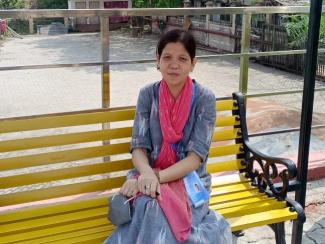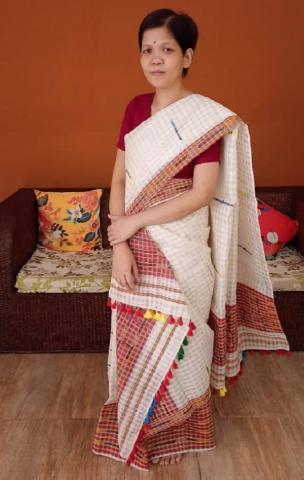
Devika Phukan, currently a professor in Guwahati, not only battled Sjogren’s but also the trauma caused due to lack of understanding of her condition by medical practitioners (in far flung areas) and the social taboos and ostracization by loved ones.
This article has been contributed by Sjogren’s India to highlight the need for early diagnosis and awareness among the medical community.
“More than the physical harm from the disease, it was the emotional damage that was debilitating … the attitude of doctors and friends and the attitude of our society which spells out norms for you and me (women).”
- Devika Phukan
Devika suffered from a bout of very high viral fever when she was in her final year of graduation. Incorrect diagnosis and a high dosage of steroids caused paralysis in the upper part of her body. Overnight Devika moved from a completely independent life, to learning how to navigate using a wheelchair. Therein, started her fight with Sjogren’s and sadly she faced a very challenging time on account of delayed diagnosis which happened only after 7 years when she got an appointment at AIIMS, Delhi.
Delayed Diagnosis and a complete lack of awareness and understanding of Sjogren’s condition commonly seen in areas (especially non-metro regions) across India
After her paralysis, Devika was admitted to the hospital ICU. She was the only young patient and it was disheartening as she wondered how she would battle this condition through her life. Despite a prolonged stay in the ICU, her condition continued to be severe. Yet she was determined to complete her graduation. Devika wrote her papers from her college sick room. Subsequently she enrolled into a Master’s program, but most of her time was spent in visiting hospitals for treatment. The doctors in Dibrugarh diagnosed her with a condition “peripheral neuropathy” and treated her with high doses of steroid, which not only caused her body to bloat but also led to osteoporosis. Severe joint pain, fatigue and dental decay - common symptoms of Sjogren’s were also beginning to manifest.
“I was so desperate to get some form of treatment that I started visiting the local kaviraj for medicinal herbs. But that only worsened my condition”
“Doctors were insensitive to my condition and would ask me to sit and stand indiscriminately during physical examinations, without realizing how difficult that was for me. It was mentally draining”.
After 7 long years of her fight with this unknown disease, her brother-in-law with the intervention of the office of the then Assam Chief Minister, , secured an appointment for Devika to consult at AIIMS, Delhi. Her tests showed that she had an auto-immune condition – Sjogren’s Syndrome. This was Devika’s first definitive diagnosis of the disease.

Devika says, “Right medication, diagnosis and treatment was what helped me improve”. Vitamins and two pain killers was all the medication she was advised by her doctors. They also encouraged her to try and control her pain as much as possible. This diagnosis and proper treatment was transformational and helped Devika transition back to slowly walking independently.
A long and painful journey, which could well have been avoided had there been awareness about Sjogren’s in the community and amongst medical practitioners in far out locations.
The impact of social stigmas and taboos, an ostracization of sorts
Social stigmas and taboos are not uncommon in our country, driven by many antiquated beliefs. Devika proved to be a victim of the same too. Confined to her bed, Devika recalls the stream of questions and the emotional turbulence she experienced during this time (apart from the physical pain)
“My close friends left me because I could no longer go out with them. I suffered from severe fatigue. It showed me the worth of genuine relationships.”
“The community prodded me unendingly about who will marry me.”
“I started my job at a local college, I was not given accommodations and leaves for any treatment. I had to leave my job and return home. There was still no diagnosis and that was stressing me and my mom immensely.“
“A professor asked me why I was even thinking of doing a PhD in this condition. I wondered, people outside India go to colleges and live with dignity then why not me. I felt like I should die.”
What helped…
The realization that, “Nobody from outside can help, until I help myself”.
Some of the things which helped Devika improve her condition were dietary modifications (I have tried to avoid sugar and milk mainly. It has helped me a lot. Also no junk foods, only simple homemade food), keeping busy, understanding and acceptance of her condition and the positivity of her loved ones who supported and encouraged her continuously through this journey.
Devika says, “My mom was a huge inspiration. She worked in a college and looked after me. My father passed away when I was in Class 3 so my mom single handedly managed my physical condition without ever crying or revealing distress. She would only get angry with the doctors. Her positivity has always motivated me”.
Even though financial expenses were high my family helped me tide through. My sister encouraged me with positive books to help me through my mental anxiety.
Devika’s husband is a wild life photographer who supports her unconditionally and her mother-in law looks after her, like she would her own daughter.
Devika enrolled in her Ph.D program with a guide who pointed out how her journey could be an inspiration for her students. She later joined the college as a Professor, and she loves her interactions with her young students immensely. Her water bottle helps her stay hydrated and handle dry mouth conditions. Her life’s experiences and challenges have helped many students to easily confide in her.
Clear and positive thinking have been her hallmarks. Devika loves reading and quotes out of one of the books from her sister which have deeply inspired her…. “If you want to walk, you have to dream about running.“
An apt summary of Devika’s arduous and impactful journey. As Devika runs on, we at Sjogren’s India wish her the very best in all her endeavors.






